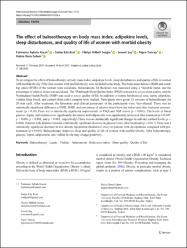The effect of balneotherapy on body mass index, adipokine levels, sleep disturbances, and quality of life of women with morbid obesity

View/
Access
info:eu-repo/semantics/openAccessDate
2020Author
Koçak, Fatmanur AybalaKurt, Emine Eda
Milletli Sezgin, Fikriye
Şaş, Senem
Tuncay, Figen
Erdem, Hatice Rana
Metadata
Show full item recordCitation
Koçak, F. A., Kurt, E. E., Milletli Sezgin, F., Şaş, S., Tuncay, F., & Erdem, H. R. (2020). The effect of balneotherapy on body mass index, adipokine levels, sleep disturbances, and quality of life of women with morbid obesity. International Journal of Biometeorology, 64(9), 1463-1472.Abstract
To investigate the effect of balneotherapy on body mass index, adipokine levels, sleep disturbances, and quality of life in women with morbid obesity. Fifty-four women with morbid obesity were included in the study. The body mass indexes (BMI) and waist/hip ratios (WHR) of the women were calculated. Subcutaneous fat thickness was measured using a *skinfold meter, and the percentage of adipose tissue was calculated. The *Pittsburgh Sleep Quality Index (PSQI) was used to assess sleep quality, and the Nottingham Health Profile (NHP) was used to assess quality of life. In addition to routine biochemical tests, leptin, adipokine, visfatin from blood, and cortisol from saliva samples were studied. Participants were given 15 sessions of balneotherapy for 20 min each. After treatment, the laboratory and clinical parameters of the participants were *reevaluated. There was no statistically significant difference of BMI, WHR, and percentage of adipose tissue between before and after treatment measurements (p ˃ 0.05).There was a statistically significant improvement in PSQI and NSP scores (p ˂ 0.001). The levels of blood glucose, leptin, and visfatin were significantly decreased, and adiponectin was significantly increased after treatment (p = 0.047, p ˂ 0.001, p ˂ 0.001, and p ˂ 0.001, respectively).There was no statistically significant changes in salivary cortisol levels (p = 0.848). Patients with diabetes showed a statistically significant decrease in glucose levels after treatment (p = 0.017).There was a statistically significant decrease in low-density lipoprotein cholesterol levels in patients with dyslipidemia compared with pre-treatment (p = 0.018). Balneotherapy improves sleep and quality of life of women with morbid obesity. After balneotherapy, glucose, leptin, adiponectin, and visfatin levels may change positively. © 2020, ISB.

















